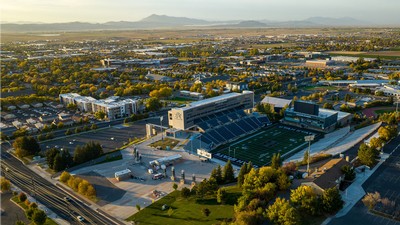USU Watershed Sciences Grad Student Awarded EPA STAR Fellowship
Utah State University graduate student Nate Hough-Snee is the recipient of a U.S. Environmental Protection Agency STAR (Science to Achieve Results) Graduate Fellowship. A doctoral student in ecology in USU’s Department of Watershed Sciences and Ecology Center, Hough-Snee receives a two-year, $84,000 grant to study riparian ecosystems across the American West.
Using large datasets collected during multiple projects over the past decade from such sources as the National Oceanic and Atmospheric Administration, the U.S. Geological Survey and the U.S. Forest Services, Hough-Snee is investigating the effects of climate change on riparian and wetland zones spanning six Western states.
“We can tell a compelling story from disparate datasets about Western streams and rivers and changes in their structure and biodiversity,” he says. “Questions include ‘What’s the current condition of riparian plant communities?’ and ‘What are the services provided by those ecosystems?’”
Since joining USU in 2011, Hough-Snee, author of the blog, Perceptible Changes, has led several projects using large-scale monitoring data from the USFS PACFISH/INFISH Biological Opinion and NOAA’s Columbia Habitat Monitoring Program. Working with these programs, he teamed with other scientists monitoring fish habitat in the Columbia, Snake and Missouri River basins for Endangered Species Act-listed fish, including steelhead, bull trout and salmon species.
With faculty advisor Joe Wheaton, USU and USFS researcher Brett Roper and former USU grad student Ryan Lokteff, Hough-Snee just completed a study on how riparian vegetation communities of the Pacific Northwest are responding to multiple environmental factors.
“We’re examining the effects of management by state, federal and private entities, land uses such as grazing and logging, as well as climatic changes,” he says. “We’re also investigating the efficacy of stream restorative practices here in Utah and across the Pacific Northwest.”
In addition to these projects, Hough-Snee is working with Wheaton, Kent Sorenson of the Utah Division of Wildland Resources, private landowners and public land managers to develop ways to use beavers in river restoration in river restoration in rural northern Utah. Wheaton’s efforts with this type of restoration recently appeared in national media.
“In the arid West, many streams have become incised, lowering the streambed’s elevation, through erosion,” he says. “These streams become disconnected from floodplains, which causes degradation of fish and wildlife habitats.”
The scientists plan to reintroduce beavers — nature’s engineers — to the area to build dams that will enable sediment deposition that will raise the streambeds of incised waterways.
“With this method of restoration, we hope to improve in-stream habitat throughout the watershed, which is home to genetically pure Yellowstone cutthroat trout,” Hough-Snee says.
Beyond the field, the grad student is an organizer for the 2014 USU-led Restoring the West Conference slated for Oct. 21-22 on Utah State’s Logan campus. The theme for this year’s gathering is “Managing for Resilient Riparian Corridors.”
“This is a great opportunity for students to exchange ideas with some of the nation’s top researchers and present their own research a professional forum,” he says.
An early registration discount is offered for participants who register by Oct. 9. Visit the conference website for more information.
Related links:
- “River Restoration? Leave it to Beavers say USU Scientists,” Utah State Today
- USU Department of Watershed Sciences
- USU Ecology Center
- USU Quinney College of Natural Resources
Contact: Nate Hough-Snee, 435-535-5085, nate@natehough-snee.org
Writer: Mary-Ann Muffoletto, 435-797-3517, maryann.muffoletto@usu.edu
Nate Hough-Snee, doctoral student in USU's Department of Watershed Sciences and the USU Ecology Center, is a 2014 recipient of the U.S. Environmental Protection Agency’s STAR - Science to Achieve Results – Fellowship.
At a research site, USU grad student Nate Hough-Snee takes note on vegetation. The restoration ecologist is studying riparian ecosystems across the American West.
TOPICS
Awards 712storiesComments and questions regarding this article may be directed to the contact person listed on this page.







